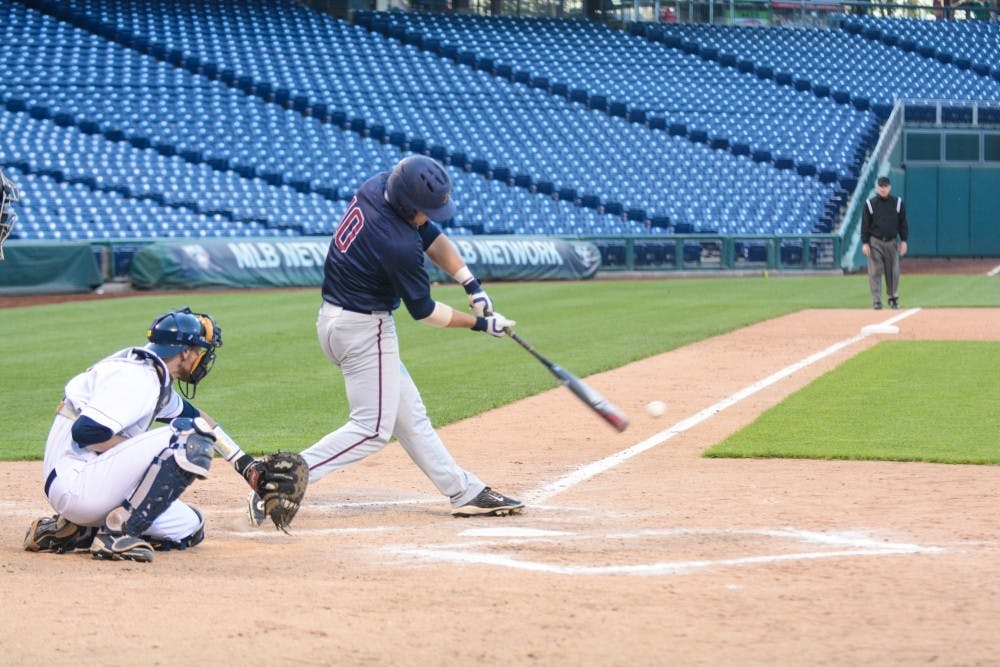
Senior catcher Tim Graul may have been the best player in the Ivy League this year, but his three hits were not enough to propel Penn to victory in the Ivy League Championship Series.
Credit: Cole Jacobson , Cole JacobsonOuch.
Seeking its first conference title since 1995, Penn baseball fell to Yale in the Ivy League Championship Series in two games on Tuesday, 5-0 and 11-7.
The Quakers (23-22, 12-8 Ivy) were dominated all day long by the Elis (30-16, 16-4) in every facet of the game. Yale’s offensive power was unmatched by the Quakers until it was too late as starters Scott Politz and Eric Brodkowitz outdueled Penn’s seniors Jake Cousins and Adam Bleday and the defense came up with innumerable web gems that prevented the Quakers from even reaching base.
Game 1 starter Cousins kept things close for a while, but the Yale bats were able to wear him down late, scoring 5 runs spread across the fourth, fifth, and sixth innings. The first three innings were evenly matched 0-0 baseball. Both teams had baserunners, but well hit balls found fielders and the pitchers were able to negotiate somewhat sticky situations. That ended in the fourth, when a leadoff walk issued to Yale right fielder Harrison White came back to hurt Cousins. The Bulldogs had a baserunner in every inning, and manufactured runs in the fifth and sixth innings, via consistent hitting and porous defending.
Neither team was charged with errors, but the difference in fielding was perhaps the biggest factor in the difference on the scoreboard. Yale consistently made outstanding plays to keep the Quakers off the base paths, while Penn misplayed crucial moments. Freshman shortstop Dai Dai Otaka in particular was spectacular for the Bulldogs, making play after play to turn routine base hits into spectacular outs. Meanwhile, non-error blunders from the Quakers turned potential inning ending double plays into rally sustaining fielder’s choices.
Meanwhile, Penn couldn’t get any type of offense going. Yale’s Politz pitched a shutout complete game, allowing only 5 hits – all singles – spread out across his nine innings. The Quakers only reached second base twice, and both times failed to advance a runner further. Politz was efficient, but his stuff was not overpowering. The Yale hurler only struck out five. Instead, his success was predicated on allowing the Quakers to make contact and relying on his defense behind him. Every ball off a Penn bat seemed to gravitate towards a Bulldog fielder.
While the Quakers hung around in the early stages of Game 1, Game 2 was almost over before it even started. Yale’s Tim DeGraw hit Bleday’s second pitch of the game to the gap for a leadoff double, and it was only downhill from there. Bleday was yanked before he finished his third inning, giving up eight runs on nine hits including two homers. Gabe Kleiman, who came in for Bleday in the third inning, would give up a third home run. By the end of the third it was 10-0 Yale.
After the deficit was extended to 11 in the fifth, the Penn bats finally woke up. The rally was fueled by an error from Yale’s Dai Dai Otaka, who suddenly looked human after his amazing showing earlier in the day. With the change in Yale’s defensive fortunes came Penn’s resurgence. Three runs in the fifth came from small ball: walks, errors, and sacrifice flies made the inning a sabermetrics delight. Two Penn homers, contributed by senior Tim Graul and junior Daniel Halevy closed the game to four.
In the bottom of the ninth, the Quakers were able to load the bases with two outs. The tying run was at the plate to complete the most miraculous of comebacks. Instead, the batter, freshman Chris Adams, struck out.
The Quakers failed to ever take a lead in the series sweep, and were shut out for the first 13 innings. Penn looked terrible; you can put the blame on the nerves of playing for a conference title, the unfortunate rescheduling, the timing after commencement, or whatever other excuse you can think of. The truth is much simpler: Yale was the better team.
In a year where some Penn teams collapsed under pressure in big moments, Penn baseball salvaged what could have been the most embarrassing. At the halfway mark in Game 2, the combined score was 16-0. That is an embarrassing defeat under any standard. The game was out of reach, and it wouldn’t have been out of question for the Quakers to give up on a day where nothing was going their way.
But the Quakers didn’t give in. Like the “zombie” men’s basketball team in the winter, the Red and Blue found the guts and heart to battle it out to the bitter end. They came up short, but that shouldn’t take away from the effort and resilience they showed in the face of an insurmountable deficit.
Penn baseball did not win the Ivy League title. The Quakers now have the longest title drought in the conference at 22 years. That said, they also had their best season in a decade, finally taking the next step in winning the Lou Gehrig Division. They put up the fifth most wins in school history.
But knowledge of this season’s progress doesn’t lessen the pain of this series loss. This one hurts.
The Daily Pennsylvanian is an independent, student-run newspaper. Please consider making a donation to support the coverage that shapes the University. Your generosity ensures a future of strong journalism at Penn.
Donate







